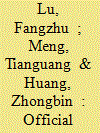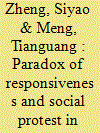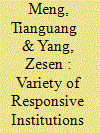|
|
|
Sort Order |
|
|
|
Items / Page
|
|
|
|
|
|
|
| Srl | Item |
| 1 |
ID:
192230


|
|
|
|
|
| Summary/Abstract |
Social media is the most popular platform for the expression of public opinion, and it is a critical channel through which researchers can observe the dynamics and patterns of public opinion. This study explores the political origins of Chinese nationalism by focusing on how official media shapes mass nationalism in Cyber China. Analyzing 26 million Weibo posts made during the coronavirus (COVID-19) pandemic, we found significant variations in nationalism among user types, localities, and stages of the pandemic. Unlike previous studies, we found that the official Chinese media did not always play the expected role of promoting nationalism; instead, it acted as a system of emotional valves that channeled social sentiment. Official media is intended to stabilize social sentiment and prevent social unrest, and nationalistic news stories are used to draw attention away from domestic problems.
|
|
|
|
|
|
|
|
|
|
|
|
|
|
|
|
| 2 |
ID:
178761


|
|
|
|
|
| Summary/Abstract |
Prior studies regard responsiveness as an effective institution for Chinese government to mitigate social protests based on the premise that citizens adopt more institutionalized channels as soon as the regime makes it available. We challenge this notion by arguing that institutionalized and noninstitutionalized channels are not substituting but complements, and improving responsiveness to institutionalized participation may ironically lead to more protests. We collected a unique dataset and employed machine-learning to measure the quality of local responsiveness. We find that improving responsiveness has a positive effect on protests and identify updating citizens’ beliefs on repression as major mechanism. The findings suggest the availability of new institutionalized channels may not have the intended substitutive effects on noninstitutionalized participation, and thus authoritarian co-optation could have unintended consequences.
|
|
|
|
|
|
|
|
|
|
|
|
|
|
|
|
| 3 |
ID:
174398


|
|
|
|
|
| Summary/Abstract |
The widespread use of the ICTs (information and communication technologies) has reshaped the state-society relations and is driving the diffusion of digital responsiveness, which is serving as a channel to link public opinions and policymaking. A growing body of literature focuses on how the Chinese government responds to the public in cyberspace. However, how responsive institutions are shaping the quality of responsiveness is underdiscussed. We explore a variety of responsive institutions in subnational China and examine their effect on response quality through automated text analyses to massive citizen-government interactive records. There exist six parallel typologies of responsive institutions, including party office, government office, inclusive agency, functional agency, supervision agency, and petition office. Compared with the others, party and government office, professional functional agencies are more likely to stimulate the improvement of response quality. Agencies with limited political authority often fail to make a highquality response. The degree of institutionalization does not improve response quality but facilitates response timeliness. Local leaders' demonstration behavior, however, counteractively has a positive effect on response quality.
|
|
|
|
|
|
|
|
|
|
|
|
|
|
|
|
|
|
|
|
|